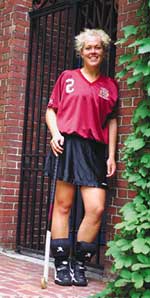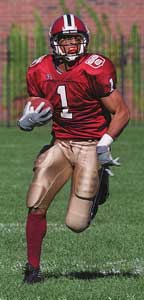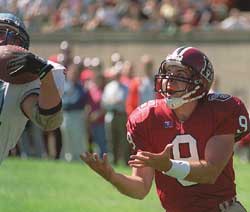![]()
Main Menu ·
Search ·
Current Issue · Contact · Archives · Centennial · Letters to the Editor · FAQs
![]()
Main Menu ·
Search ·
Current Issue · Contact · Archives · Centennial · Letters to the Editor · FAQs

 Schoolwerth, all suited up near Leverett House, where she lives. Photograph by Rose Lincoln |
Katie Schoolwerth '00 envies this year's freshman field hockey players. They will enjoy four seasons of home games on Harvard's new Jordan Field, an artificial-turf venue opened this fall. All Ivy League colleges but Yale now play on "turf" (short for Astroturf) surfaces, and the athletes almost unanimously prefer it to grass; for serious players, turf can be the deciding factor in choosing a college. In field hockey, the evenness or regularity of the surface greatly affects the roll of the small, hard ball. On a set play like a penalty corner shot, for example, a lump in a natural-grass field can cause the ball to hop over a player's stick and, by sheer bad luck, negate an opportunity that athletic skill has earned. "Turf is much more predictable," says Schoolwerth, who as senior tri-captain of field hockey (with Dominique Kalil '00 and Anya Cowan '00) has at least one season to exercise her talents in front of home fans on a truly level playing field.
Not that the vagaries of grassy Cumnock Field ever stopped her from excelling. Schoolwerth has started every field hockey game that Harvard has played since she arrived--54 games through the end of last year. She has been an all-Ivy League selection every season, First Team in her freshman and junior years, Second Team as a sophomore. For the last two seasons, she's been a Second Team Regional all-American.
As sweeper, Schoolwerth plays defense, but her quick hands and explosive shot nonetheless enabled her to tie for second in Ivy scoring last year, with 14 points. Her scoring opportunities typically come on penalty corners, where she is often the player designated to take the shot on goal. "She's got a good stick, she can hit the ball hard, and create options off the corner," says her coach, Sue Caples. "Plus, Katie's a real leader, and you want your leadership involved on big plays."
As sweeper, Schoolwerth has a more flexible defense role than the left, center, or right backs, who are generally assigned to mark a specific opponent. The sweeper can mark anyone who gets loose from other defenders, or can choose to double-team. Schoolwerth usually plays in front of the marking backs. "Since I'm not a marker, I have more freedom to go with the ball," she says. "I get to participate more in the flow of play." Her speed and excellent field vision have caused a host of problems for attackers, whose mistakes sometimes snowball as the game wears on. "The more frustrated someone gets, the sloppier they play," explains Schoolwerth, who ought to be dubbed the "Grim Sweeper" for her ability to kill off opponents' attacks.
Schoolwerth wasn't always a defender, or even a stickwoman: growing up in Richmond, Virginia, she played soccer. A turning point came in eighth grade, when her father, a Dutch nephrologist, moved the family to an Amsterdam suburb for a year. There, Schoolwerth played soccer with boys as well as with a women's side that included 25- to 45-year-old teammates. She also learned field hockey. Back in Richmond, at the Collegiate School, Schoolwerth was spectacularly versatile, earning 12 varsity letters: four in field hockey, plus two apiece in soccer, lacrosse, indoor track, and gymnastics. A midfielder, she had been through soccer's Olympic development program and found that she "hit a wall, I couldn't improve." Things were far different in field hockey, where she was twice voted Most Valuable Player in her league; Collegiate won the independent schools' league field hockey championship three times while fielding Schoolwerth as a center midfielder. However, at Harvard, Caples soon channeled her talents to defense.
Those rare skills may yet contribute to a league championship, a pleasure the Crimson have savored only twice in 20 years, in 1990 and 1991. This fall, the Harvard stickwomen jumped off to a 7-2 start (3-0 Ivy) in their first nine games, hoping to improve on last year's 9-9 (5-2 Ivy) record and perhaps dethrone perpetual Ivy power Princeton, winner of five consecutive league titles. Despite the loss of all-time scoring leader Judy Collins '99, and even though the Harvard squad is fairly young, with only four seniors and four juniors, Schoolwerth calls it "the best team in my four years here. We have a lot of depth. There's not much difference between the people who are starting and those who aren't." If that's literally true, then this year--following the lead of perennial starter Schoolwerth--expect the entire Crimson squad to make all-Ivy.
~ Craig Lambert
An extensive regrading of the western reaches of Soldiers Field isn't the only sign of renewal on the far side of the Charles. The football team's early games, played in idyllic early-autumn weather, supplied convincing evidence that coach Tim Murphy's squad is rebounding.
 Terence Patterson executed a perfect reverse, good for a 30-yard touchdown, as Harvard finished off Columbia 24-7. Photograph by Jon Chase |
After a record-setting Ivy championship season in 1997, last year's team was beset by injuries and wound up with a 4-6 record, tying Columbia for fifth place in league standings. "Last year really brought us down to earth," says Chris Menick '00, the team's premier running back. "We have a bunch of seniors who have been playing since their freshman year, and we pushed ourselves to the limit the entire off-season." The beneficial results of those extraseasonal efforts were evident in the team's 24-7 defeat of Columbia, a 25-17 win at Holy Cross, and an epic tussle with a talented, well-drilled Colgate squad that snatched a 24-21 victory by scoring a last-second field goal. Those contests left no question that this is a Crimson team with plenty of weapons, plenty of depth at the so-called skill positions, and, most important, plenty of fight.
Coach Murphy made a key personnel change before the Columbia game, replacing senior quarterback Rich Linden with Brad Wilford, a senior who saw spot duty as a reserve last year. Linden, who in 1996 became the first freshman to start at quarterback for the Crimson, had been at the controls for a record 26 games. He holds the Harvard record for pass completions and is within striking distance of the records for passing yardage and touchdown passes. His output a year ago, however, didn't match that of his sophomore season. Wilford, who is sizable (6 feet, 3 inches; 220 pounds) and strong-armed, turned in a solid performance against Columbia, completing 12 of 22 passes for 190 yards and running for 71. The defensive unit yielded an early touchdown to the Lions, then kept them at bay for 56:08 minutes of play. Senior linebacker Isaiah Kacyvenski set up two Harvard scores with an interception and a fumble recovery, and his 14 tackles raised his career total to 274, a Harvard record. The first two touchdowns were scored by Troy Jones, a fleet senior who missed most of two seasons with a hip injury and a broken arm, and who now alternates with Menick at tailback. Senior Mike Giampaolo later added a field goal, and senior split end Terence Patterson took a reverse that was good for a 30-yard score. His rangy understudy, freshman Carl Morris, had four receptions for 89 yards. Remarkably, for a first outing, the offensive unit enjoyed a fumble-free day.
At Worcester next weekend, Holy Cross took a 14-3 lead on the strength of two late-first-quarter touchdowns scored only 17 seconds apart. Harvard struck back with a pair of touchdowns in the second quarter. Hauling in a pass from Wilford at midfield, diminutive junior tailback Chuck Nwokocha wove his way through a slew of defenders for a 41-yard score that gave the Crimson the lead. Holy Cross marched downfield in the last two minutes of the game, but quarterback Ryan Collar's last-ditch end-zone pass was ruled out-of-bounds. By completing 17 of 29 passes for 202 yards and two touchdowns, Wilford earned a Golden Helmet Award as New England's Division I player of the week. Senior cornerback Kane Waller had two interceptions. With 112 yards in 21 carries, Menick notched the eleventh hundred-yard game of his career.
 Excuse me? Quarterback Brad Wilford (9) was the intended recipient of a pass thrown by running back Chris Menick in the Columbia game, but the trick play backfired when the ball was snared in the end zone by Columbia defensive end Chris Nugent. Harvard's Isaiah Kacyvenski intercepted on the next play, however, and halfback Troy Jones then scored. Photograph by Jon Chase |
Back at the Stadium a week later, Harvard had to play catch-up again. Colgate's formidable defense and strong punting kept the Crimson offense penned up for the first half, and the defense struggled to contain the productive Red Raider attack, expertly operated by record-setting senior quarterback Ryan Vena. The second of two breakaway touchdowns by hard-running tailback Randall Joseph staked Colgate to a 21-7 lead as the third quarter ended. But a 20-yard interception return by senior rover back Mike Madden ignited the first of two explosive Harvard drives, climaxed when Wilford dove in from the one-yard line. On the team's next possession, a 26-yard pass to Patterson--his ninth catch of the day--brought Harvard to the Colgate 33. Then came the split-end reverse that Patterson runs so nimbly--plus, as a former high-school quarterback, he also can throw the ball. At the left sideline he pivoted and lofted a pass to freshman flanker Kyle Cremarosa in the end zone. Giampaolo's conversion kick made the score 21-21, with 1:24 left to play.
"I really thought, with our momentum, that if we could get the game into overtime we could win it," Murphy said later. "But [Ryan Vena] is one of those guys...who can find a way to hurt you." And Vena did. Mixing passes with short runs of his own, he concocted a drive that carried Colgate to Harvard's 16-yard line. With less than five seconds to play, kicker Erich Kutschke made good on a 33-yard field goal that gave the Raiders a three-point victory.
Murphy, who maintains his equanimity after even the toughest loss, said at a postgame press conference that his team deserved "an 'A' for effort," but "did not do enough things consistently well." Based on its early showing, this team seemed likely to gain in consistency as the season progressed.
~ "Cleat"
Early Fall Sporting
Men's Soccer Under new head coach John Kerr, the booters (2-5-1, 1-1 Ivy) started less than auspiciously. They notched their first Ivy win, 2-1 over Columbia, before falling, 3-0, to Yale. Midfielder Armando Petruccelli '00 and forward Will Hench '00 have helped spark the attack.
Women's Soccer The netwomen (6-1-1, 2-0 Ivy) began strongly, knocking off their first two Ivy opponents, Columbia (2-1) and Yale (1-0). They also captured the tournament they host, the Harvard Invitational, besting Penn 2-1 in overtime, before taking out ninth-ranked Brigham Young, 1-0, in the final.
Field Hockey In early going, the strong, deep stickwomen (7-2, 3-0 Ivy) were beaten only by the country's top-ranked squad, Connecticut, 2-1, and by Massachusetts, 3-2.. They handily dispatched Columbia, Yale, and Penn in their initial Ivy contests.
Main Menu ·
Search · Current Issue · Contact · Archives · Centennial · Letters to the Editor · FAQs
![]()